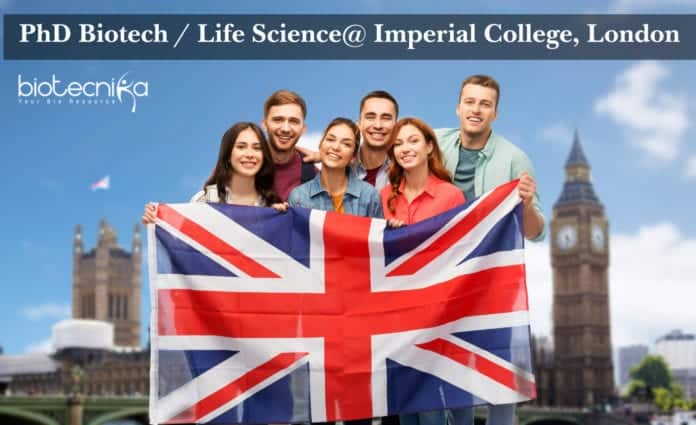PhD Biotech in London
Exclusive opportunity to do phd biotech in london with Imperial College offering studentships in the year 2019-2020. Interested candidates can check out all of the detail regarding the phd studentship offer, the eligibility, the degrees acceptable, the application procedure, timeline and more below:
This call expires in :
The Royal British Legion Centre for Blast Injury Studies (CBIS) at Imperial College London is housed within the leading Department of Bioengineering, attracting outstanding students and researchers from around the world. The Centre is comprised of multidisciplinary collaborations involving military medical officers and civilian scientists and engineers who tackle difficult research problems using a clinically-led strategy.
Assessing the effects of blast injury develops and advances in treatment, recovery and rehabilitation from injury when enhancing reduction and encouraging understanding of complex trauma. Students will gain from an extremely stimulating environment where they tackle a range of additional training and development opportunities as part of their Centre’s PhD cohort.
Table of Contents
Funded PhD Opportunities
Please, see below for current opportunities. To find out more about the projects listed below, please contact the supervisor(s) related to the project in which you’re interested.
Details on eligibility and how to apply may be found in the drop-down sections below. For any general enquiries not covered on these webpages, please contact [email protected].
| Project title | Supervisor(s) | Closing date |
|---|---|---|
| In vitro and in vivo models of inappropriate bone formation | Dr Claire Higgins | 04 July 2019 |
In vitro and in vivo models of inappropriate bone formation
Heterotopic ossification is the inappropriate formation of bone in soft tissues of the body in response to a blast (high energy shockwave induced) event. Work in the centre has focused on separating out the direct effect of the shockwave on cells, with the effect of the systemic response the body has to an injury. Using a shocktube to create single 165kPa shockwaves, we have identified methylation specific changes in gene promoters, which we have correlated with excess bone deposition in an in vitro system. One of these differentially methylated genes is a novel therapeutic target, which we believe can be used to prevent heterotopic ossification. Using ATAC-Sequencing, we have also found chromatin rearrangements in this target which lead to ossification. In this PhD project, we want to use advanced molecular biology approaches to investigate the validity of this therapeutic target, using both in vitro and in vivo models of heterotopic ossification.
Projects: how many studentships are available and for which projects?
We’re currently inviting applications for a single CBIS studentship position.
If you’re considering applying for a PhD studentship within the Centre, please visit the under section titled ‘Application: am I qualified and, if so, how can I apply?’ For more info.
Funding: what does a CBIS studentship cover?
Studentships cover three years of Home-EU tuition fees and provide a 3-year, tax-free stipend at the standard Research Council United Kingdom rate (Number 16,999 per annum for 2019-20). Additionally, a generous allowance is provided for research consumables and conference attendance.
Any non-Home-EU applicants need to prove they can cover the difference between the Home-EU and abroad tuition fee rates.
Application: am I eligible and, if so, how do I apply?
Candidates that meet the College’s PhD programme entry requirements are eligible to apply. |Entry on the PhD programme demands an undergraduate degree at 2:1 level or greater and, generally, a master’s degree with merit or higher (or even non-UK equivalent) in engineering, or some of the physical sciences or math.
To apply to the CBIS PhD program, please see the College’s admissions web pages to look at the instructions. When creating an account on the submission platform, or when beginning a new application, pick ‘Doctoral’ as the Course Type and choose ‘Bioengineering Research (CBIS)’ as the Academic Program. Your application ought to be submitted no later than 04 July 2019.
Within the”Supporting Documents” area of the online application portal, you’ll have to upload a personal statement of up to 2 pages which covers the below points. {This is supposed to be uploaded in the”Research Proposal” section.
- Why you want to undertake a PhD within the Centre for Blast Injury Studies;
- Your reasons for your preferred topic area(s) and supervisor(s);
- A description of your experience so far would make you a perfect candidate to take on a PhD from the Centre.
The deadline for applications is currently 04 July 2019. Following this date, applications will be sent to the supervisors for review. We’ll then contact you to let you know whether you’ve been shortlisted for the interview.
For general information about CBIS, its activities and opportunities, please contact us at [email protected].
Prerequisites for Graduate Studies
All entry conditions listed in the published prospectus in addition to on our online class lists are in regard to UK qualifications only and represent the minimum requirement required to be considered for entrance. Programs often do request greater than our minimum requirements, as a result of demanding and aggressive nature of the programs.
If You Would like to apply for a Masters degree that the College minimal requirement is a UK Lower Second Class Honours level. Nearly all programs have greater requirements, typically a minimum of a UK Upper Second Class Honors.
For entrance to some PhD, MPhil, MD (Res) or EngD research programme that the College would generally expect you to maintain or achieve a Master’s degree along with a Bachelor’s degree at UK Upper Second Class Honours Level.
For information about our minimum entrance requirements for global qualifications please see our official Country Index. All entrance requirements are invented by Imperial College London and are unique to the College.
Please be aware that fulfilling academic requirements doesn’t guarantee entrance, it’s just one of the variables taken into consideration when selectors make their choice: additional elements such as suitability for your program, competence in English (you need to have passed a College-approved English evaluation ), applicable work experience and testimonials will also be significant.
Note for research (PhD) applicants
If you are applying for a postgraduate research degree and are asked to present formal evidence of English language ability, you will need to fulfill the Imperial College London Postgraduate English Requirement. This involves taking the Imperial College London initial English assessment (English Assessment 1) as soon as you start your PhD studies. After this assessment, internal classes (which are free of charge) may be recommended, and you may be reassessed at a later stage to evaluate your progress.
The aim of this requirement is to help and encourage you to work on your English language skills and to ensure that you receive the necessary support to complete your PhD successfully and communicate your work in the wider academic community. For more information please see the Centre for Academic English website.
While every effort has been made to ensure that this information is up-to-date, Imperial College London can accept no liability for any inaccuracies or alterations of which it may be unaware.
Eligibility for Indian Students:
To be considered for admission to a Master’s e.g. MSc, MRes, MBA etc, applicants should normally have completed a four year Bachelor’s degree from a mainstream university (state/federal or ‘deemed’ institution) passed with a final mark of 75% or CGPA 8.5+. Applicants graduating from one of the elite Indian Institutes of Technology should have completed a four year Bachelor’s degree passed with CGPA 7+.
Applicants for research should hold a four year Bachelor’s degree passed at the prescribed level and also be in possession of a Master’s degree, passed at the same level.
From the Indian universities listed below, we will accept a three year Bachelor’s degree with 75% or CGPA 8.5+ for Master’s entry, and a three year Bachelor’s degree passed at the prescribed level plus a Master’s degree for research.
- Aligarh Muslim University
- All India Institute of Medical Sciences
- Andhra University
- Banaras Hindu University
- Bangalore University
- Christ University (from 2008)
- Guru Nanak Dev University
- Indian Institute of Science, Bangalore
- Indian Statistical Institute
- Jadavpur University
- Jamia Millia Islamia
- Jawaharlal Nehru University
- Kurukshetra University
- Narsee Monjee Institute of Management Studies
- Osmania University
- Panjab University
- University of Calcutta
- University of Delhi
- University of Hyderabad
- University of Madras
- University of Mumbai
- University of Mysore
- University of Pune
- Visva Bharati University
APPLY ONLINE
Editor’s Note: phd biotech in london, phd life sciences in london, phd studentships. imperial college london studentships 2019, imperial college london phd admissions, phd jobs, exclusive indian students phd studentships 2019 london, check out the Biotecnika Times Newsletter, Podcast and all of our social media for the latest in the industry.

































